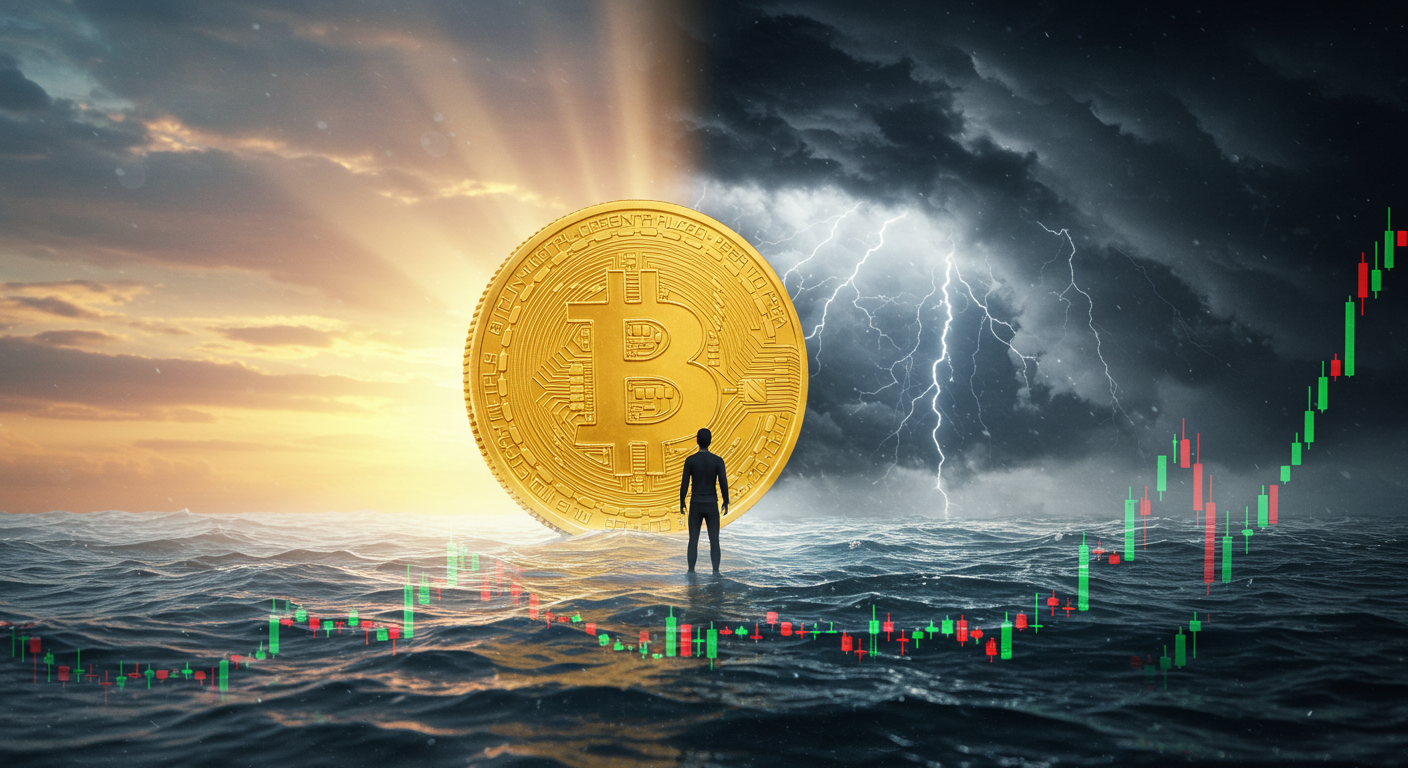Blog

Is Bitcoin Halal? What Muslim Investors in Singapore Need to Know After Bitcoin Hits $100K
Assalamu'alaikum and hello everyone, Syed Afiq here from Modern Muslim Finance.
It’s been hard to miss the headlines recently – "Bitcoin Crosses $100,000!" This news certainly sparks a lot of conversation, especially within our Muslim community here in Singapore. When we see such dramatic movements in the financial world, it's natural to wonder: What does this mean for my investments? Is this an opportunity, or a risk I should be wary of from an Islamic perspective?
At Modern Muslim Finance, our goal is always to help you "Spend Guilt-Free, Live Worry Free and Retire Early" by making informed financial decisions rooted in our Islamic values. So, let's delve into what this Bitcoin milestone might signify and consider how we, as Muslim investors, can navigate this evolving landscape.
What's Behind Bitcoin's Recent Surge?
From my observations, Bitcoin's recent climb above the $100,000 mark isn't due to just one factor. It appears to be a mix of several key elements:
Market Optimism and Institutional Interest: There's a renewed sense of confidence in the market, with large institutions showing fresh interest.
Policy Developments: Speculation is growing about potentially more favorable regulatory agreements in the U.S., particularly involving key crypto players. This hints at a possibly more accommodating environment for crypto firms.
Macroeconomic Factors: Expectations that the U.S. Federal Reserve might pause or reduce interest rates can increase investor appetite for assets perceived as higher risk, including digital currencies. Bitcoin, much like traditional assets, is increasingly influenced by broader economic trends and geopolitical shifts.
"Digital Gold" or Highly Speculative? The Ongoing Debate
Bitcoin is often dubbed "digital gold." This nickname comes from its limited supply (only 21 million coins will ever exist), its decentralized nature, and its potential to act as a hedge against the devaluation of traditional currencies. Some investors, particularly in regions facing economic instability, see it as a modern way to store value.
However, this is still a hotly debated topic. Bitcoin's price is known for its extreme volatility. We've seen its value swing by thousands of dollars in mere days! While those who've held it for the long term might point to impressive historical gains, short-term investors are exposed to the risk of sudden and significant losses.
For us, as Muslim investors, this volatility is a key concern. Islamic finance principles emphasize risk-sharing and a degree of certainty. The highly speculative nature of Bitcoin's price movements might not sit comfortably with these principles. Is it an emerging asset class with long-term utility, or is its current value driven more by speculation? This is a question we must seriously consider.
The Shifting Global and Regulatory View
Interestingly, Bitcoin's journey is also being shaped by policy and power. There are signals of a potentially less hostile regulatory stance in the U.S. Furthermore, several Muslim-majority countries like the UAE, Malaysia, Indonesia, and Turkey have been developing frameworks to regulate, rather than outright ban, cryptocurrencies. This suggests a global shift from fear towards managing these digital assets. If global trade policies start to accommodate digital assets more openly, it could pave the way for wider participation, including by ethically-conscious investors.
However, significant uncertainties remain. Governments worldwide continue to voice concerns about the potential for cryptocurrencies to be used in money laundering, illicit financing, or to create market instability. So, beyond the Halal considerations, there are also political and regulatory risks to be aware of.
The Big Question: Is Investing in Bitcoin Halal?
This is perhaps the most critical question for Muslim investors, and based on my research and understanding of Islamic finance, there isn't a single, universally agreed-upon answer.
Arguments for Permissibility: Some Islamic scholars view cryptocurrencies like Bitcoin as digital assets that possess real-world utility and value. They argue that owning and trading them can be Halal, provided there's no involvement in prohibited activities like gambling (Maisir) or excessive speculation, and the transactions are transparent.
Arguments for Caution: Other scholars adopt a more cautious stance. They raise concerns about Bitcoin's extreme volatility, its lack of backing by tangible assets (unlike traditional Islamic finance products), and whether its trading patterns too closely resemble Gharar (excessive uncertainty) or Maisir (gambling).
I always encourage Muslim investors to refer to qualified scholars and Islamic finance experts when evaluating the permissibility of such assets. This aligns perfectly with our ethos at Modern Muslim Finance – the importance of seeking knowledge ('ilm).
What Should Muslim Investors in Singapore Consider?
Bitcoin reaching $100,000 is undoubtedly a major financial event. But as Halal-conscious investors, how should we process this? Based on my understanding and our core principles, here are some key takeaways:
1. Acknowledge the Volatility: The recent gains are impressive, but the crypto market can turn very quickly. Avoid making decisions driven purely by FOMO (Fear Of Missing Out) or short-term price hype.
2. Understand the Uncertain Long-Term Outlook: Is Bitcoin truly "digital gold," or is it in a speculative bubble? Experts are still debating its ultimate use case and long-term stability.
3. Navigate the Varied Shariah Status: Since there's no single scholarly consensus, you, as an individual investor, need to do your research. Understand the different viewpoints and align your decisions with the opinions of trusted experts and your own informed conscience.
4. Prioritize Diversification: This is a golden rule in investing. Even if you conclude that investing in Bitcoin can be permissible for you, it should not form the bulk of your portfolio. A balanced approach across various Halal asset classes – such as Shariah-compliant equities (perhaps through platforms offering Halal screening), gold, Sukuk (Islamic bonds), and property – remains crucial for long-term financial well-being.
5. Invest Only What You Can Afford to Lose: Given the high-risk nature, any allocation to cryptocurrencies should be money that, if lost, would not derail your essential financial goals or cause undue hardship.
6. Seek Knowledge & Professional Advice: Continue to educate yourself. For personalized guidance tailored to your financial situation and goals here in Singapore, consult with a qualified Islamic financial advisor.
Living Worry-Free, Even with Market Volatility
Bitcoin's journey past the $100,000 mark is a clear indicator that our financial world is constantly changing. New technologies and asset classes will continue to emerge.
For us in the Muslim community, these moments are both a signal and a challenge. They call on us to deepen our understanding, carefully weigh the ethical boundaries set by our faith, and thoughtfully decide what role, if any, such assets should play in a truly Halal and diversified portfolio. By approaching these new frontiers with knowledge, caution, and a commitment to our Islamic principles, we can strive to build wealth in a way that brings us not just financial returns, but also peace of mind. InshaAllah.
---
Important: The information and opinions in this article are for general information purposes only. They should not be relied on as professional financial advice. Readers should seek independent financial advice customised to their specific financial objectives, situations & needs.
This advertisement or publication has not been reviewed by the Monetary Authority of Singapore.
Address:
114 Lavender Street, #07-83 CT Hub 2,
Singapore 338729
Email:
[email protected]
WhatsApp:
+65 8952 8511
Website:
modernmuslim.finance








